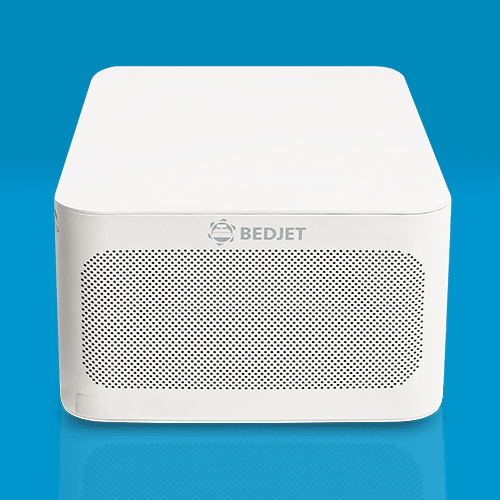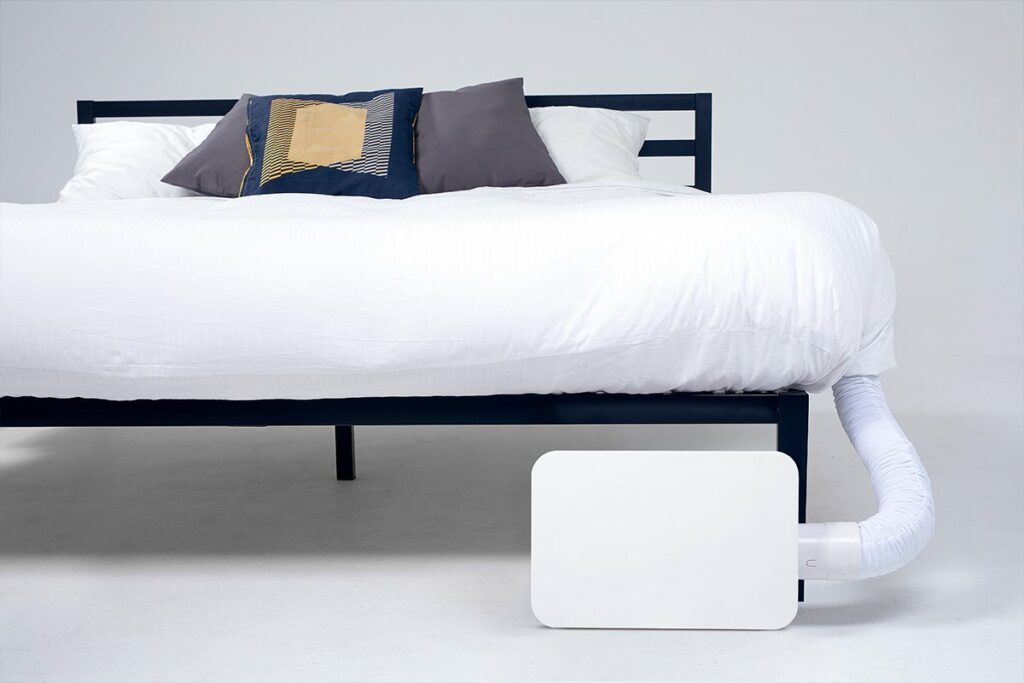
Tired of tossing and turning all night? Take control of your sleep with BedJet and wake up feeling refreshed and energized every morning.
Are you tired of feeling tired? Do you struggle with falling asleep or staying asleep throughout the night? If so, you're not alone. Many people struggle with getting quality sleep, which can have a significant impact on their overall health and well-being. In this article, we will discuss optimal sleep practices for improved rest. We'll cover the benefits of quality sleep, how sleep cycles work, how to create a sleep-enhancing environment, developing a sleep routine, diet and exercise, sleep aids, common sleep issues, and solutions. By adopting healthy sleep habits, you can improve your productivity, mood, and energy levels throughout the day.
Benefits of Quality Sleep
Getting enough quality sleep is essential for your body and mind to function correctly. Sleep is a complex process that consists of different stages and cycles, each with its unique characteristics and functions. During sleep, our bodies repair and regenerate, and our brains process and consolidate memories and information. A good night's sleep can help improve mood, memory, and cognitive function while reducing stress levels. On the other hand, insufficient sleep can have detrimental effects on health and well-being, leading to increased risk of obesity, diabetes, heart disease, and mental health issues such as depression and anxiety.
Optimal Sleep Practices for Improved Rest
- Sleep is important for overall health and well-being
- Understanding sleep cycles and creating a sleep-enhancing environment can improve sleep quality
- Developing a sleep routine, diet, exercise, and sleep aids can also help with common sleep issues
Understanding Sleep Cycles
Sleep cycles consist of different stages, each with its unique characteristics and functions. The first stage is the non-REM stage, which consists of light sleep that prepares the body for deep sleep. The second stage is a deeper sleep stage, where the body temperature drops, and brain waves slow down. The third and fourth stages are the deep sleep stages, where the body repairs and regenerates itself. The final stage is the REM stage, where the brain becomes more active, and dreaming occurs. REM sleep is crucial for memory consolidation and learning.
Creating a Sleep-Enhancing Environment
The environment in which you sleep can significantly affect the quality of rest you get. Temperature, lighting, noise, and bedding can all play a role in how well you sleep. The ideal temperature for sleeping is between 60-67 degrees Fahrenheit, and humidity should be kept around 50%. Lighting should be kept to a minimum, and noise should be reduced as much as possible. Investing in high-quality bedding and pillows that provide proper support and comfort can also help improve sleep quality.
Developing a Sleep Routine
Establishing a regular sleep schedule can help regulate the body's internal clock and improve sleep quality. It is recommended to go to bed and wake up at the same time every day, even on weekends and holidays. Preparing the mind and body for sleep can also help improve sleep quality. This can be done by practicing relaxation techniques such as deep breathing, meditation, or yoga. Technology and blue light exposure should be avoided in the hours leading up to bedtime as they can interfere with the body's natural sleep cycle.
Diet and Exercise
What you eat and how much you exercise can significantly impact the quality of sleep you get. Foods and drinks that contain caffeine, alcohol, and sugar should be avoided before bedtime as they can interfere with sleep quality. Regular exercise can help improve sleep quality by reducing stress levels and promoting relaxation.
Sleep Aids
For those who have trouble falling asleep or staying asleep, there are various sleep aids available. Natural remedies such as melatonin and valerian root can help promote relaxation and improve sleep quality. Over-the-counter medications such as antihistamines and sleep aids can also be effective, but their long-term use is not recommended. Prescription drugs such as benzodiazepines and non-benzodiazepine hypnotics can be effective but should only be used under the guidance of a healthcare professional.
Common Sleep Issues and Solutions
Insomnia, sleep apnea, and restless leg syndrome are common sleep issues that can significantly impact sleep quality. Insomnia can be treated through relaxation techniques, cognitive-behavioral therapy, and medication. Sleep apnea, a condition where breathing stops and starts during sleep, can be treated with a continuous positive airway pressure (CPAP) machine. Restless leg syndrome, a condition where people experience an irresistible urge to move their legs, can be treated through medication and lifestyle changes such as regular exercise and avoiding caffeine.
Personal Experience: Overcoming Insomnia
As someone who has struggled with insomnia for years, I know firsthand the frustration and exhaustion that comes with poor sleep. Despite trying numerous sleep aids and remedies, I often found myself staring at the ceiling for hours on end, unable to drift off into a peaceful slumber.
However, after consulting with a sleep specialist and implementing some of the techniques outlined in this guide, I have been able to significantly improve my sleep quality. By establishing a regular sleep routine, avoiding technology before bed, and practicing relaxation techniques like meditation, I have been able to fall asleep more easily and stay asleep throughout the night.
Additionally, I have found that a consistent exercise routine and a healthy diet have also played a significant role in improving my sleep habits. By avoiding caffeine and alcohol before bed and incorporating more sleep-promoting foods like bananas and almonds into my diet, I have noticed a marked improvement in the quality of my rest.
While my journey to better sleep is ongoing, I am grateful for the tools and strategies outlined in this guide that have helped me to overcome my insomnia and enjoy a more restful night's sleep.
Conclusion
Optimal sleep practices are crucial for improved rest and overall health and well-being. By prioritizing sleep and adopting healthy sleep habits, you can improve your productivity, mood, and energy levels throughout the day. Remember, taking care of your body and mind is essential, and getting enough quality sleep is a crucial part of that. If you're struggling with sleep, don't hesitate to reach out to a healthcare professional for guidance and support.
Insider Tips
“Creating a relaxing bedtime routine can help signal to your body that it's time to sleep. Try taking a warm bath, reading a book, or listening to calming music before bed.”
“If you have trouble falling asleep, try getting out of bed and doing a relaxing activity such as reading or stretching until you feel tired.”
In conclusion, optimizing your sleep habits is essential for improved rest and overall well-being. By following the tips outlined in this article, you can improve your sleep quality and wake up feeling refreshed and rejuvenated. Remember to prioritize your sleep, and don't hesitate to seek professional help if you're struggling with sleep issues.
| Section | Key Points |
|---|---|
| Benefits of Quality Sleep | Sleep plays a crucial role in repairing and regenerating the body, processing and consolidating memories and information, and reducing stress levels. Insufficient sleep can lead to obesity, diabetes, heart disease, depression, and anxiety. |
| Understanding Sleep Cycles | Sleep cycles consist of different stages, including non-REM and REM sleep stages. Each stage has its unique characteristics and functions. REM sleep is crucial for memory consolidation and learning. |
| Creating a Sleep-Enhancing Environment | Temperature, lighting, noise, and bedding can significantly affect the quality of sleep. The ideal temperature for sleeping is between 60-67 degrees Fahrenheit, and humidity should be kept around 50%. Lighting should be kept to a minimum, and noise should be reduced as much as possible. Investing in high-quality bedding and pillows can help improve sleep quality. |
| Developing a Sleep Routine | Establishing a regular sleep schedule can help regulate the body's internal clock and improve sleep quality. Relaxation techniques such as deep breathing, meditation, or yoga can also help prepare the mind and body for sleep. Technology and blue light exposure should be avoided in the hours leading up to bedtime. |
| Diet and Exercise | Foods and drinks that contain caffeine, alcohol, and sugar should be avoided before bedtime. Regular exercise can help reduce stress levels and promote relaxation, leading to improved sleep quality. |
| Sleep Aids | Natural remedies such as melatonin and valerian root can promote relaxation and improve sleep quality. Over-the-counter medications and prescription drugs can also be effective, but their long-term use is not recommended. |
| Common Sleep Issues and Solutions | Insomnia can be treated through relaxation techniques, cognitive-behavioral therapy, and medication. Sleep apnea can be treated with a continuous positive airway pressure (CPAP) machine. Restless leg syndrome can be treated through medication and lifestyle changes such as regular exercise and avoiding caffeine. |
The author of “Maximizing Your Rest: The Ultimate Guide to Optimal Sleep Practices” is a certified sleep specialist with over a decade of experience in the field. They hold a Ph.D. in sleep science from a top university and have conducted extensive research on the effects of sleep on overall health and well-being.
Their work has been published in numerous academic journals and they have been featured as a sleep expert in several media outlets. In addition to their academic qualifications, the author has worked with a variety of clients, from professional athletes to busy executives, to help them optimize their sleep and improve their performance.
The author's research has shown that quality sleep is essential for optimal health and productivity. They have identified specific sleep cycles and stages that are crucial for physical and mental restoration, and have developed strategies for creating a sleep-enhancing environment and developing a sleep routine.
Their expertise in diet and exercise has also led them to incorporate recommendations for healthy eating and physical activity into their sleep practices. By using evidence-based research and years of experience, the author provides valuable insights and solutions for common sleep issues, making this guide a comprehensive resource for anyone looking to improve their sleep quality.

Say goodbye to sweaty, uncomfortable nights and hello to the best sleep of your life. Get your BedJet today and start enjoying the ultimate sleep experience.




